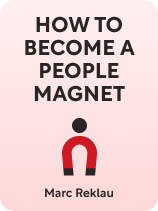

This article is an excerpt from the Shortform book guide to "How to Become a People Magnet" by Marc Reklau. Shortform has the world's best summaries and analyses of books you should be reading.
Like this article? Sign up for a free trial here.
Do people enjoy being around you? Is there more tension between you and others than you would like to have?
Getting along with others is a crucial skill that can enhance your personal and professional life. Marc Reklau, in his book How to Become a People Magnet, says you can build stronger connections and create a more harmonious environment around you by showing appreciation and avoiding conflict.
Keep reading for Reklau’s advice on how to get along with other people.
Getting Along With Other People
Social success is about more than just making good first impressions. It also requires you to get along with the people around you. If you charm everyone initially but don’t put time and effort into maintaining your existing relationships, people won’t want to be around you for long. In his book, Reklau shares his advice for how to get along with other people: Show appreciation and respect, and avoid conflict.
(Shortform note: Some experts note that if you take time to build relationships with the people around you, you can even overcome a bad first impression. When your transition from meeting someone to building a relationship isn’t quite smooth, you may have to apologize for your social faux pas or try to “reset” the way you act around them to something more natural. However, it’s not impossible to get along with people you failed to charm the first time around.)
Strategy #1: Show Appreciation
An important part of getting along with others is consistently showing that you appreciate and respect them. This makes people feel good about themselves, which they’ll associate with being around you. Reklau offers three methods to show appreciation or respect.
1) Give Compliments
The first method Reklau describes is offering honest and specific compliments. When a compliment feels honest, people will take your appreciation more seriously. When a compliment is specific, it makes people feel like you respected them enough to pay close attention to them. If you’re not sure what to specifically compliment someone about, Reklau suggests telling people what they want to hear. For example, if someone is worried they’ll come across as boring during a work presentation, compliment them afterward on how passionate they were. This will make them feel good about themselves and give them a reason to want to be around you more.
2) Actively Listen
Second, Reklau says you should carefully and actively listen to others. This shows people that you appreciate and respect their input and what they have to say. Active listening requires you to give your conversation partner your full attention. Look at them while they speak and don’t think about other things—mentally rehearsing what you’ll say next, for instance. You should also show you’re engaged by leaning forward and nodding, agreeing, or asking questions when appropriate.
3) Support Words With Actions
Finally, Reklau says you should also back up what you say with actions. If you tell people you appreciate and respect them but don’t act like it, people will start to take you less seriously. But if you back up what you say, people will trust you more and therefore appreciate you and your company more. Supporting words with actions can be as simple as not being late—showing you respect the other person’s time—or sticking to your word and following through on promises.
Strategy #2: Avoid Conflict
Reklau explains that to maintain a good relationship with others, you should try to avoid any kind of conflict. Conflict is a lose-lose situation—even if you get what you want, you still make the other person feel bad and damage your relationship. He offers three methods for avoiding conflict: don’t take offense easily, don’t try to change others, and make sure any criticism you give is constructive.
1) Don’t Take Offense
To avoid conflict, Reklau suggests you don’t take offense to what other people say and do. When you treat their words and actions as personal attacks, you’re more likely to get hurt and become confrontational. Instead of assuming people are trying to judge or insult you, ask them what they mean. If they’re offering constructive criticism, you can learn a lot by listening and being open to it. And if someone is judging or insulting you, tell yourself that it’s their problem and that getting into an argument won’t help anything. You should remain positive even if someone is being mean and be willing to forgive them—getting mad and holding grudges wastes time and energy.
For example, Tim tells Amy that she’s “a very tough person.” Instead of assuming Tim is calling her mean and harsh, Amy asks him what he means. Tim says he meant that she’s determined and strong even during hard times. By not taking offense right away to Tim’s comment, Amy avoided potential conflict.
2) Don’t Try to Change Others
You can also avoid conflict by not trying to change the opinions and behaviors of others, explains Reklau. People are usually set in their ways and tend to get more stubborn and defensive when challenged. Because of this, trying to change others is usually an unproductive source of tension. Reklau recommends you avoid the urge to change others by focusing on people’s strengths instead of their faults. When you pay more attention to what you like about someone, you’ll want to change them less.
3) Give Constructive Criticism
Reklau recommends that you avoid criticizing others as much as possible since you can’t change others and should avoid potential conflicts. But if you do need to offer criticism, he suggests framing it positively and constructively. This makes people feel less judged or personally attacked, leading to fewer conflicts. For example, you offer praise before and after your criticism to soften it with positivity, and ask the other person for potential solutions so they feel like you’re working together to constructively address the problem.

———End of Preview———
Like what you just read? Read the rest of the world's best book summary and analysis of Marc Reklau's "How to Become a People Magnet" at Shortform.
Here's what you'll find in our full How to Become a People Magnet summary:
- Why charisma is a learned skill, not something you’re born with
- How to make a first impression that’s unforgettable
- How to persuade people to do what you want






